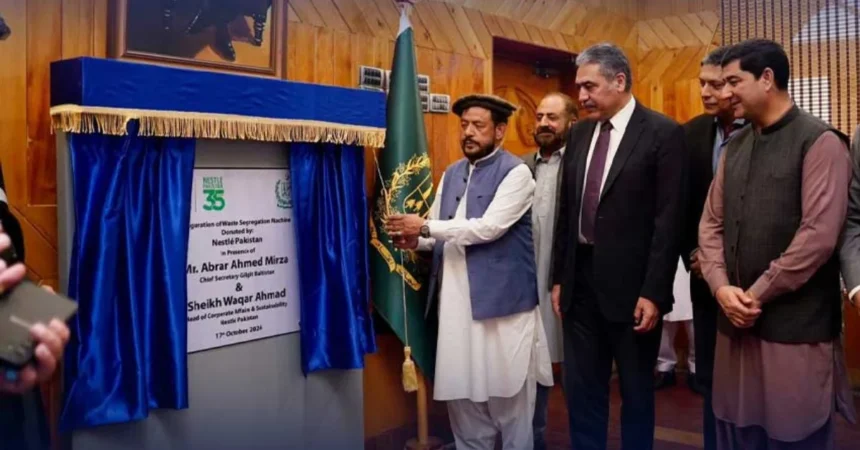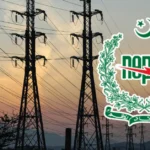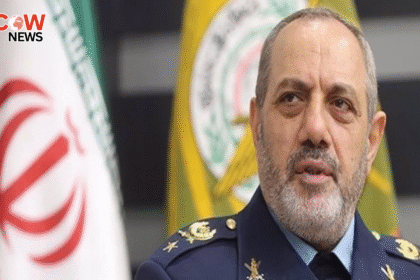Nestlé Pakistan has marked a significant milestone in its sustainability efforts with the installation of the first waste segregation machine in Gilgit, part of the Clean Gilgit-Baltistan Project (CGBP). The initiative was inaugurated by Chief Secretary Gilgit-Baltistan, Abrar Ahmad Mirza, emphasizing the importance of innovative waste management solutions in the region, particularly as it faces increasing environmental challenges due to tourism and urban development.
Purpose of the Initiative
The newly installed waste segregation machine is located at a collection site operated by the Gilgit-Baltistan Waste Management Company (GBWMC). Its primary purpose is to facilitate the sorting and segregation of various types of waste, particularly plastic and paper. By improving waste management practices, Nestlé aims to contribute to a cleaner environment and promote responsible waste disposal among local communities.
Chief Secretary Mirza praised Nestlé’s commitment to reducing packaging waste in the region. “We are delighted that Nestlé is making great efforts to reduce packaging waste in the region, and the progress of the Clean Gilgit-Baltistan Project is a testament in this regard,” he stated during the inauguration.
Previous Efforts Under the CGBP
Prior to this installation, Nestlé had already undertaken several initiatives aimed at improving waste management in Gilgit-Baltistan. The company previously installed three compressing and baling machines in key locations: Gilgit, Hunza, and Skardu. These machines enhance the region’s capability to process waste effectively and efficiently.
In addition to the machines, Nestlé placed 122 benches and waste bins made from recycled plastic at popular tourist sites. Furthermore, the company distributed 15,000 reusable bags to local communities, promoting sustainable practices among residents and visitors alike. These efforts have collectively facilitated the management of over 6,000 tons of plastic packaging in the region over the past five years.
Nestlé’s Vision for Environmental Sustainability
Nestlé’s commitment to sustainability is rooted in its global vision to reduce the environmental impact of packaging waste. Sheikh Waqar Ahmad, Head of Corporate Affairs and Sustainability at Nestlé Pakistan, articulated this vision: “We are accelerating our actions to reduce the environmental impact of various kinds of packaging waste. Our vision is that none of our packaging, including plastics, ends up in landfill nor in oceans, lakes, and rivers.”
This ambitious goal aligns with the United Nations Sustainable Development Goals (SDGs), particularly those focused on responsible consumption and production. Nestlé’s initiatives not only aim to mitigate waste but also seek to inspire communities to adopt sustainable habits.
The Role of Public-Private Partnerships
The Clean GB Project exemplifies the power of public-private partnerships in addressing environmental challenges. Sheikh Waqar Ahmad highlighted the necessity of collaboration, stating, “Tackling packaging waste requires collective action. Leveraging public-private partnerships is crucial for finding improved solutions to reduce, reuse, and recycle.”
Such partnerships are vital for creating sustainable solutions that benefit both the environment and local economies. By working together, government entities and private companies can implement effective strategies to tackle waste management issues.
Future Plans and Commitments
Nestlé Pakistan has outlined several future commitments under the Clean GB Project. Plans include the donation of an additional waste segregation machine for Skardu, as well as the installation of 100 more benches throughout the Gilgit-Baltistan region. Moreover, the company intends to launch waste management training programs targeted at the hospitality sector, in collaboration with the GBWMC and the Environmental Protection Agency (EPA).
These initiatives aim to enhance awareness and improve waste management practices in a region that sees significant tourist traffic due to its breathtaking landscapes and adventure opportunities. By engaging local businesses and communities, Nestlé hopes to foster a culture of sustainability that extends beyond mere compliance with regulations.
The Importance of Gilgit-Baltistan
Gilgit-Baltistan is not only a stunning tourist destination in Pakistan but also a region rich in biodiversity. However, its unique ecosystems face threats from pollution and waste generated by tourism and urbanization. Therefore, initiatives like the Clean GB Project are essential for preserving the environment while accommodating the growing number of visitors.
The region is renowned for its spectacular mountain ranges, including parts of the Karakoram, and attracts trekkers, mountaineers, and nature lovers from around the world. Ensuring that Gilgit-Baltistan remains a pristine environment is crucial not only for the local community but also for the global ecological landscape.
Community Involvement and Awareness
Community engagement is a cornerstone of the Clean GB Project. Nestlé’s initiatives aim to foster a sense of ownership among local residents, encouraging them to take an active role in waste management. By distributing reusable bags and installing benches in public spaces, Nestlé seeks to instill sustainable practices in everyday life.
Awareness campaigns focused on the importance of recycling and responsible waste disposal are essential for changing behaviors. Nestlé’s collaboration with local government bodies and organizations like the GBWMC ensures that these messages reach a wide audience, promoting a culture of environmental stewardship.
Addressing the Waste Management Challenge
Waste management in Gilgit-Baltistan presents unique challenges due to the region’s topography and infrastructure limitations. The influx of tourists often exacerbates these issues, leading to increased waste generation. The Clean GB Project addresses these challenges by providing the necessary tools and technologies to improve waste processing capabilities.
The introduction of the waste segregation machine is expected to enhance the efficiency of waste management efforts in the region. By facilitating better sorting of materials, the machine can help increase recycling rates and reduce the amount of waste that ends up in landfills or the natural environment.
The Role of Education and Training
As part of its commitment to improving waste management practices, Nestlé is also focusing on education and training. The planned training programs for the hospitality sector aim to equip local businesses with the knowledge and skills needed to manage waste responsibly. This initiative is crucial for ensuring that the tourism industry contributes positively to the environment rather than exacerbating waste-related issues.
By raising awareness and providing practical training, Nestlé hopes to empower local businesses to adopt sustainable practices that can be shared with their customers and communities. This ripple effect can lead to broader changes in behavior regarding waste management and environmental conservation.
Collaborating with Local Authorities
Collaboration with local authorities is essential for the success of the Clean GB Project. By working closely with the Gilgit-Baltistan government and relevant agencies, Nestlé aims to align its initiatives with local policies and priorities. This collaboration ensures that the project is not only effective but also sustainable in the long term.
The involvement of government officials in the inauguration of the waste segregation machine underscores the importance of these partnerships. Senior government officials, including the Minister for Planning & Development and representatives from the Environmental Protection Agency, participated in the event, signaling their support for the project.
Measuring Impact and Success
As with any initiative, measuring the impact and success of the Clean GB Project is crucial for understanding its effectiveness and making necessary adjustments. Nestlé is likely to implement monitoring and evaluation mechanisms to assess the outcomes of its waste management efforts.
These evaluations could include tracking the amount of waste processed by the segregation machine, the volume of materials recycled, and the level of community engagement in sustainability initiatives. Gathering data will help Nestlé refine its approach and ensure that the project meets its objectives.
Looking Ahead
The Clean GB Project represents a significant investment in the future of Gilgit-Baltistan. By focusing on waste management, sustainability, and community engagement, Nestlé aims to create a model that can be replicated in other regions facing similar challenges.
As the project progresses, continued support from local authorities, community members, and stakeholders will be essential for its success. By fostering a culture of sustainability and environmental responsibility, Nestlé hopes to leave a lasting positive impact on the region.
Through initiatives like the Clean GB Project, companies can play a pivotal role in addressing environmental challenges while promoting economic development and community well-being. The collaboration between Nestlé Pakistan and the Gilgit-Baltistan government serves as an inspiring example of how public-private partnerships can drive positive change in society.







